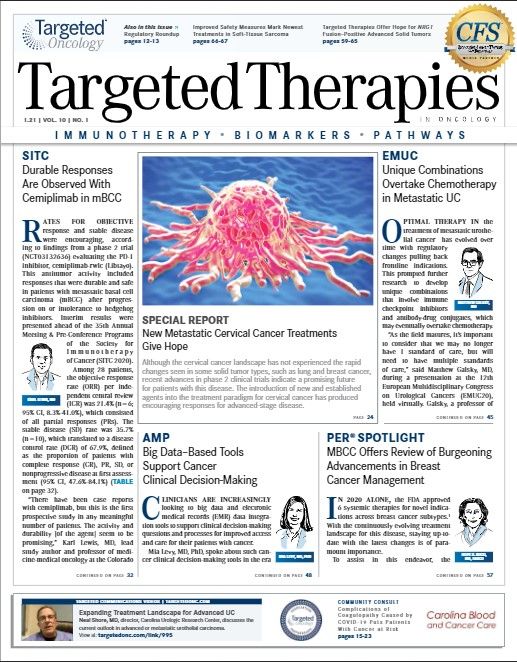Urelumab Combo Leads to Improved Pathologic Response in Resectable PDAC
Improved antitumor activity of the triplet combination of urelumab, a GVAX vaccine, and nivolumab was observed in patients with resectable pancreatic ductal adenocarcinoma, according to findings from a 3-arm phase 1/2 trial.

Improved antitumor activity of the triplet combination of urelumab, a GVAX vaccine, and nivolumab (Opdivo) was observed in patients with resectable pancreatic ductal adenocarcinoma (PDAC), according to findings from a 3-arm phase 1/2 trial (NCT02451982) that were presented during the 35th Annual Meeting & Pre-Conference Programs of the Society for Immunotherapy of Cancer (SITC 2020). Specifically, a 30% pathologic response rate and a mild toxicity pro-file for the triplet was also observed in the trial.
The 3 pathologic responses were moderate per the College of American Pathologists grade 2 criteria. Nine patients remain disease free after a median follow-up of 12 months.
“[This is a] preliminary sign of the antitumor efficacy [of the regimen],” wrote Lei Zheng, MD, PhD, lead author, and professor of oncology and surgery and codirector, Pancreatic Cancer Precision Medicine Center of Excellence Program at Johns Hopkins University School of Medicine in the poster. “The immune and clinical efficacy of anti-CD137 agonist-based combinations war-rant further investigation.”
The GVAX vaccine is an allogeneic pancreatic cancer cell vaccine that expresses granulocyte-macrophage colony-stimulating factor. The off-the-shelf product, produced at Johns Hopkins University Good Manufacturing Practice, is safe but has modest activity as a single agent.
Urelumab is a fully human anti-CD137 agonist immunoglobulin G4 monoclonal antibody. In mouse models, the immune costimulatory molecule CD137 within the tumor microenvironment remained inactivated after vaccine-induced T-cell and PD-1 inhibition. Supported by additional preclinical studies, investigators theorized that the addition of urelumab could provide synergistic benefit.
The trial consists of 3 arms: GVAX alone (arm A), GVAX plus nivolumab (arm B), and GVAX plus nivolumab and urelumab (arm C).
Eligible patients were at least 18 years of age, had R0/R1 resection, radiographic evidence of resectable pancreatic ductal adenocarcinoma, no prior anticancer treatment, no active autoimmune disease, and adequate hematologic, renal, and hepatic functions.
An increase in intratumoral CD137-positive and CD8-positive T cells served as the primary objective of the study. Evaluation of safety, overall survival, disease-free survival, and other immune parameters served as secondary end points.
In arm A, patients received 200 mg/m2 of cyclophosphamide intravenously (IV) on day 0 and 5 × 108 cells of the GVAX vaccine intradermally on day 1 two weeks prior to surgery, 6 to 10 weeks following surgery, and every 4 weeks for 4 cycles after adjuvant chemotherapy.
In arm B, patients received 200 mg/m2 of cyclophosphamide and 480 mg of IV nivolumab on day 0 and 5 × 108 cells of the GVAX vaccine intradermally on day 1, two weeks prior to surgery, 6 to 10 weeks following surgery, and every 4 weeks for 4 cycles after adjuvant chemotherapy.
In arm C, patients received IV nivolumab at a dose of 480 mg plus 8 mg of IV urelumab and 200 mg/m2 of IV cyclophosphamide on day 0, two weeks prior to surgery, 6 to 10 weeks following surgery, and every 4 weeks for 4 cycles after adjuvant chemotherapy. The GVAX vaccine was administered intradermally on day 1.
Between February 2019 and August 2020, 10 evaluable patients were enrolled and under-went R0 resection. All 10 patients received at least 2 cycles of the study regimen. Toxicities were mild and consisted of grade 1 vomiting (n=2),fatigue (n=4), flu-like symptoms (n=2), arthritis (n=1), grade 1/2 nausea (n=7), periorbitaledema without pruritus around the eyes (n=1),and grade 2 abdominal pain (n=1), anorexia(n=1), diarrhea (n=1), thyroiditis (n=1), pruritus (n=3), peripheral sensory neuropathy (n=1), and increased liver function tests (n=1).Two cases of grade 3 rash were also reported, which responded quickly to oral steroids and did not recur after redosing.
“Previous observations of liver toxicity with urelumab or other T-cell agonists and severe immune-related adverse effects were not observed in this trial, suggesting urelumab is safe as neoadjuvant/adjuvant therapy in this resectable PDAC patient population,” concluded the study authors.
REFERENCE:
Zheng L, Judkins C, Hoare J, et al. Urelumab (anti-CD137 agonist) in com-bination with vaccine and nivolumab treatments is safe and associated with pathologic response as neoadjuvant and adjuvant therapy for resect-able pancreatic cancer. Poster presented at: Society for Immunotherapy of Cancer’s 35th Anniversary Annual Meeting & Pre-Conference Program; November 9-14, 2020; virtual. Abstract 812.

Survivorship Care Promotes Evidence-Based Approaches for Quality of Life and Beyond
March 21st 2025Frank J. Penedo, PhD, explains the challenges of survivorship care for patients with cancer and how he implements programs to support patients’ emotional, physical, and practical needs.
Read More